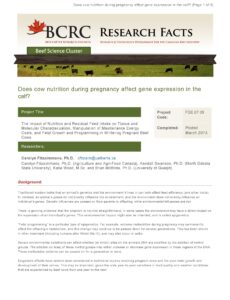Does Cow Nutrition During Pregnancy Affect Gene Expression in the Calf?
Remarque : cette page web n’est actuellement disponible qu’en anglais.
Traditional wisdom holds that an animal’s genetics and the environment it lives in can both affect feed efficiency (and other traits). In contrast, an animal’s genes do not directly influence the environment, and the environment does not directly influence an individual’s genes. Genetic influences are passed on from parents to offspring, while environmental influences are not.
There is growing evidence that the situation is not that straightforward; in some cases the environment may have a direct impact on the expression of an individual’s genes. This environmental impact might also be inherited, and is called epigenetics.
Epigenetic effects have seldom been considered in nutritional studies involving pregnant cows and the post-natal growth and development of their calves. This may be important, given the wide year-to-year variations in feed quality and weather conditions that are experienced by beef cows from one year to the next.
A recently-completed research project funded by the National Check-off and Canada’s Beef Science Cluster examined how the pregnant cow’s energy intake during the wintering feeding period affects fetal development and fetal programming, as well as post-natal calf growth and development.
The results of the study suggest that maternal nutrition during pregnancy can result in changes in the methylation and expression of genes that regulate cell growth and differentiation in their fetuses, although no obvious effects were seen in fetal body size or dimensions. The next steps are to determine whether pre-natal nutrition also affects economically important beef production traits.
To learn more about this research, view the BCRC fact sheet.
Click here to subscribe to the BCRC Blog and receive email notifications when new content is posted.
The sharing or reprinting of BCRC Blog articles is welcome and encouraged. Please provide acknowledgement to the Beef Cattle Research Council, list the website address, www.BeefResearch.ca, and let us know you chose to share the article by emailing us at info@beefresearch.ca.
We welcome your questions, comments and suggestions. Contact us directly at info@beefresearch.ca or generate public discussion by posting your thoughts below.
